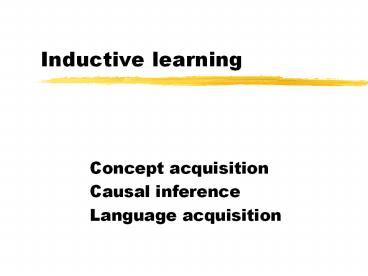Inductive learning - PowerPoint PPT Presentation
1 / 23
Title: Inductive learning
1
Inductive learning
- Concept acquisition
- Causal inference
- Language acquisition
2
Induction vs. deduction
- Induction
- Deciding what is to be learned
- Figuring out new computer applications
- Inference and generalization
- Deduction
- Syllogistic reasoning
- Conclusions are necessary if the premises are
true. - Logical errors are possible.
3
Deductive reasoning
- All dogs have tails.
- Bo is a dog.
- Therefore, Bo has a tail.
- Muffy has a tail.
- Therefore, Muffy is a dog.
- Koko has no tail.
- Therefore, Koko is not a dog.
4
I. Concept acquisition
- Hypothesis testing
- Natural concepts or categories
- Schema formation
- Prototypes or exemplars
5
Concepts
- Rational categories
- truck, bicycle, hovercraft
- tomorrow, Feb. 30, Marsday
- 25, 81, 121
- Are they learned by association (Hull, 1920)?
- Chinese radical categories
- Learning without awareness
6
Bruner, Goodnow Austin (1956)
- Find blix
7
Hypothesis testing
- What is the rule?
- What rule fits prior experience?
- Test new instances against that rule.
- Evaluate hypothesis.
- Introduces discontinuous learning.
- All-or-none learning and the backwards learning
curve - Group data vs. individual data
8
Natural categories
- Vague boundaries
- Degrees of membership Tomatoes
- Disagreement about membership
- McCloskey and Glucksberg (1978) stroke, leech,
pumpkin - Typical members have more of the features of a
category robin is a bird, penguin is sort of a
bird.
9
Schemas and exemplars
- Schemas Specific rules, prototypes. Very
rational. (Gluck Bower, 1988) - Exemplars Group assignment is based on
similarity to other examples, not on a defined
category. Very empirical. (Medin Schaffer,
1978) - Instruction, hypotheses, schemas, or exemplars?
It depends on the situation.
10
Concept acquisition
- Direct instruction, as in education
- Hypothesis testing where there are rigid rules to
be discovered - Schema theory for categories with vague
boundaries - Exemplar theory for categories with scattered
members
11
II. Causal Inference (Einhorn Hogarth, 1986)
- Statistical cues
- Spatial and temporal contiguity cues
- Kinematic cues
- Complex systems
12
Statistical cues
- Contingency analysis The 2 x 2 contingency
table, probability analysis
Effect
Humans are most sensitive to a, next to b and c,
and least to d in conscious hypothesis testing.
-
13
Spatial and temporal contiguity cues
- Lightning and thunder
- Spilled milk and kidsbut broken vase and cats?
- Bullock, Gelman Baillargeon (1982)
- If equidistant, cause closer in time was chosen
by 65 of the people - If equitemporal, cause closer in space was
chosen by 100 of the people - If one is closer in time, the other closer in
space, 70 chose the cause closer in space.
14
Prior causal models
- Wave theory Inverse square law
- Prediction of linear acceleration Depression
effect
15
Kinematic cues
- Billiard-ball movement
- timing
- velocity
- angle of reaction
- Naïve physics models
- Improve if education and experience are available
- May be parabolic The c-shaped tube problem. Why?
16
(No Transcript)
17
(No Transcript)
18
(No Transcript)
19
(No Transcript)
20
Complex systems
- Generalization from previous experience, eg.
Computer programs - Meaning of stimuli
- Control metaphors Enterprise
21
III. Language acquisition
- Vocabulary by association?
- Grammar by induction, less by rules
- Holophrastic speech
- Past-tense acquisition
- Deaf children learn language, even if it is not
taught.
22
Language A developmental process
- LAD? (Chomsky)
- Critical periods
- Songbirds
- Foreign language learning
- Aphasia and recovery
- Language universals
23
Animal language learning?
- Washoes 132 signs, some word order variation for
subject-object distinction - Premacks Sarah Plastic shapes
- Terraces critique Nim Chimpsky
- Kanzi, the bonobo Observational learning































